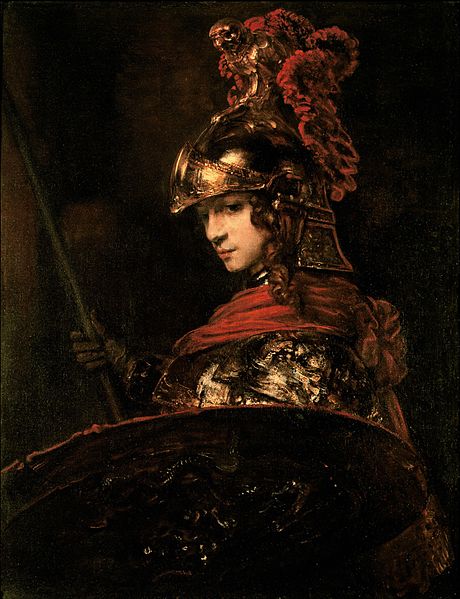PALLAS IN GREEK MYTHOLOGY
Pallas is a Titan god of the ancient Greek pantheon, born in the Golden Age of Greek mythology, before the rise of Zeus and the other Olympian deities.
Pallas God of Battle and Warcraft
Pallas was a second generation Titan, born to the first generation Titan Crius, and his wife, Eurybia, making Pallas brother to two other Titans, Astraeus and Perses.
Pallas was the Titan god of Battle and Warcraft, and similarities might therefore be drawn with Ares, the Greek god of War and Bloodlust. The name of Pallas is normally taken as a derivative of the Greek Pallo, meaning to brandish, where Pallas was perceived to be wielding a spear.
The Titan Pallas was also linked with the constellation Auriga, the Charioteer, for in antiquity the constellation rose in the night sky during mid to late spring, which was the beginning of the Greek military campaign season; linking Pallas back to Warcraft.
Pallas was the Titan god of Battle and Warcraft, and similarities might therefore be drawn with Ares, the Greek god of War and Bloodlust. The name of Pallas is normally taken as a derivative of the Greek Pallo, meaning to brandish, where Pallas was perceived to be wielding a spear.
The Titan Pallas was also linked with the constellation Auriga, the Charioteer, for in antiquity the constellation rose in the night sky during mid to late spring, which was the beginning of the Greek military campaign season; linking Pallas back to Warcraft.
Pallas a Goatish God
|
Gods, and goddesses, of the Greek pantheon were normally thought of as being of male or female appearance, but Pallas was also often depicted in goat form, and indeed, the family of Pallas had similar animal links for Crius was portrayed as a ram, Astraeus as a horse, and Perses as a dog.
Pallas and Styx |
|
Occasionally, Pallas is also named as father of Eos (Dawn) and Selene (Moon), although it is more common to class these two goddesses as daughters of Hyperion and Theia, rather than Pallas.
Pallas and The Titanomachy
Now it would be assumed that Pallas fought against Zeus during the Titanomachy, but conversely his wife, and children were the first deities to ally themselves to Zeus during the ten year war.
There is little enough said about the Titanomachy in surviving sources from antiquity, but with the defeat of the Titans, Zeus would vanquish the majority of those who opposed him to imprisonment in Tartarus, where they were guarded by the Hecatonchires. Thus, Pallas it has to be assumed was also imprisoned with his kin.
There is little enough said about the Titanomachy in surviving sources from antiquity, but with the defeat of the Titans, Zeus would vanquish the majority of those who opposed him to imprisonment in Tartarus, where they were guarded by the Hecatonchires. Thus, Pallas it has to be assumed was also imprisoned with his kin.
Pallas and Athena
|
Pallas is also a name that appears across Greek mythology, and it is a name commonly associated with the goddess Athena, when the Olympian deity is referred to as Athena Pallas.
There are a number of reasons for this connection between Athena and the word Pallas; which may or may not link back to the Titan Pallas. A confrontation occurs between Athena and Pallas during the Gigantomachy; the war between the Gigantes and the Olympian deities. Thus, Pallas is bested by Athena in combat, and taking Pallas as being in goat form during the fight, Athena subsequently flayed him, then the goddess used his skin as her aegis. The creation of Athena’s Aegis is also linked with a fight between Athena and Asterus. |
Now some writers choose to call the Pallas faced by Athena as the Titan Pallas, whilst others name him a Gigante, a son of Gaia, called Pallas; the latter assuming that the Titan Pallas would be locked up in Tartarus by the time of the Gigantomachy, but perhaps, as some suggest, Zeus had by then released the Titans from imprisonment.
It could of course simply be that the name of Athena Pallas derives from the Greek “to brandish” (Pallo), or perhaps the word Pallax, meaning “virgin” or “maiden”. Or else it is simply in honour of Athena’s playmate Pallas, a daughter of Triton, who died during a mock fight between the two goddesses.
It could of course simply be that the name of Athena Pallas derives from the Greek “to brandish” (Pallo), or perhaps the word Pallax, meaning “virgin” or “maiden”. Or else it is simply in honour of Athena’s playmate Pallas, a daughter of Triton, who died during a mock fight between the two goddesses.
|
|
